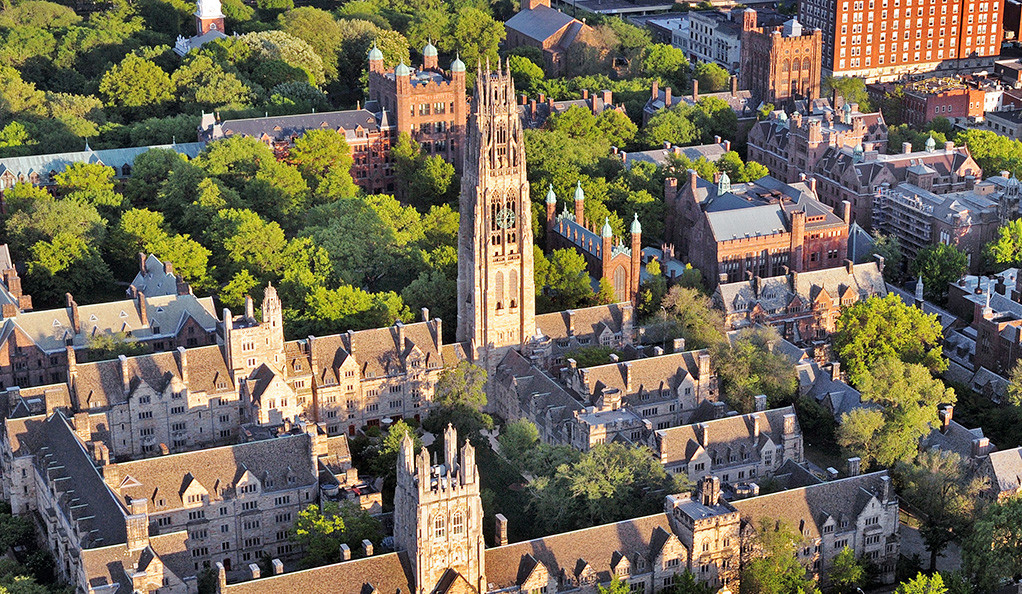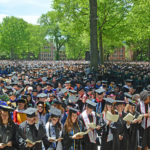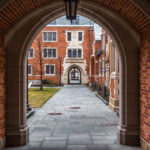Salovey unveils fall term plans for in-person instruction, likely return to full residential program

Yale News
In an email sent to the Yale community on Monday, University President Peter Salovey and University Provost Scott Strobel announced plans for a fall term that will closely resemble the Yale of years past.
Salovey and Strobel wrote that they were “cautiously optimistic” that the University could offer a full residential program in the fall. All students will be invited to return to campus, classes will primarily be in person, staff members can return to on-campus work and dining halls and performance venues will reopen to the community. The email also announced a standard academic calendar in which the semester is slated to start on Sept. 1. Students who have not been vaccinated by the start of the fall term may participate in a phased move-in process so they can receive a shot at Yale before in-person courses begin.
“Thank you for your resilience and commitment to our shared communities,” Salovey and Strobel wrote in the email. “We are excited to consider all that we have learned over the past twelve months and plan a safe and fulfilling new academic year.”
In the fall term, nearly all courses are planned to be taught in person, although some larger lectures may be held remotely. There may also be a short period of remote instruction at the start of the semester, as students who might not have had access to vaccines over the spring or summer will have the opportunity to receive them at Yale, according to the announcement.
Salovey and Strobel also expect to reopen Yale’s facilities — including spaces for art, athletics and recreation — with “enhanced safety measures” in place. It is too soon to decide definitively what those might be, but they could include masking, distancing and capacity limits, said Richard Martinello, medical director for infection prevention at Yale New Haven Hospital.
Once Yale’s officials have a clearer picture of the public health situation in the fall, they will make final decisions about the possibility of student gatherings and athletic competition. The Ivy League Council of Presidents will determine whether there can be a traditional fall athletics season.
Staff members who have been working remotely can begin phasing back into in-person work on Aug. 1. By Oct. 1, all will likely have returned. But unit leaders can elect to bring some staff back to campus starting as soon as June 1.
Vice Provost for Academic Initiatives Pericles Lewis had been developing different scenarios for the fall term and consulting with the Public Health Committee, but Salovey had the final say from among the different options.
The Public Health Committee, chaired by University COVID-19 Coordinator Stephanie Spangler, is making these decisions based on the prediction that 70 percent of Connecticut residents will be vaccinated by the close of summer, a critical mass of the population that might allow for herd immunity. The committee is also considering how to combat vaccine hesitancy among community members, including how best to share the experiences of people who received the vaccine.
Further, the committee is discussing whether to mandate vaccinations, as Rutgers University recently announced that students are required to receive the coronavirus vaccine to return to campus. So far, Yale administrators have neither decided to do the same nor ruled it out as an option.
The committee is trying to make campus as safe as possible for everyone on it, Martinello said. Though the committee has safe and effective vaccines at its disposal, some people have medical contraindications to being vaccinated, such as severe allergies. Martinello said the committee has to consider this when deciding whether to mandate vaccinations at Yale.
Additionally, there are questions about the legality of mandating vaccinations. There are three coronavirus vaccines permitted for use under an FDA Emergency Use Authorization, but they have not yet received full FDA approval.
“One could say it doesn’t make sense to have three people in the same dorm suite if they’re not vaccinated,” Dean of the School of Public Health Sten Vermund said. “There may be circumstances in which we would ask people to be vaccinated in exchange for certain job descriptions or certain living circumstances.”
But Martinello said that while there is discussion about mandates, there is no “active plan” to head in that direction.
As more people get vaccinated, questions remain as to how normal circumstances will be during the fall semester and beyond. According to Salovey’s email, there is an “initiative underway to evaluate future ways of working” that aims to assess whether some staff could continue remote work in the long term. Vermund said some people have found that they work more productively from home during the pandemic.
In a prior interview with the News, Salovey said protocols on how to limit the spread of disease might continue after the pandemic ends. Yale might keep up some of the new ways food is prepared in the dining hall, how buildings are cleaned and for what hours they are kept open. Additionally, he thinks there will be more telemedicine appointments at Yale Health, Yale Mental Health and Counseling and beyond.
Some public health precautions, including mask-wearing and asymptomatic testing, will continue into next year, Salovey said. He added that the University has additional contingency plans in place should public health conditions worsen.
As of now, the University is maintaining its restrictions on visitors coming to campus until at least the start of summer. Further information on Yale’s visitors policy will be available later in the term, Salovey wrote.
And while the fall will see largely in-person instruction, most of Yale’s summer session courses will be offered online — although there may be some expanded in-person opportunities for people living in New Haven during the summer, according to Salovey’s email. Students living on campus over the summer will adhere to the same public health protocols they have followed this spring, including asymptomatic screening and contact tracing programs.
The University has had 366 cases of COVID-19 since Jan. 1, according to its coronavirus dashboard.
Rose Horowitch | rose.horowitch@yale.edu
Clarification, March 30: The story has been updated to clarify that the announcement came from both Salovey and University Provost Scott Strobel.










